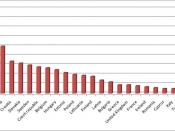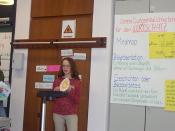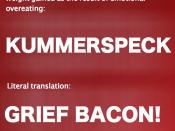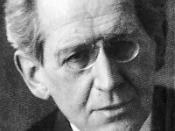The potential of literary texts in teaching and learning of German as a foreign language is a significant issue as a student and a teacher.
Teaching literature, especially a foreign one, is a complex enterprise. As in any learning situation, numerous variables exist: 1) the teacher's knowledge; 2) students level of literary sophistication; and 3) their range of linguistic fluency. Goals for the study of literature therefore depend on the level of the learner. While beginners and intermediates of German may read literary works for language practice, reading comprehension and possible appreciation of the language, the goals for undergraduates might include development of a knowledge of world literature, practice in reading and discussed creative work, and the introduction of literary concepts, genres and technologies e.g., recognition of figures of speech, levels of meaning and other stylistic features. I believe literary texts should be introduced at beginner's levels in secondary schools in order to prepare students to approach literature effectively in college.
The debate on the separation between language and literary study is ongoing. Some suggest only after the student posseses sophisticated reading skills should they be introduced to literature.
One of the most difficult problems with the learning a foreign language is the increasing gap between the secondary school and third level university of teaching German. In secondary school the student is thought the basic skills and grammatical principles and then to further your study in to an intermediate level the student is expected to transcend these skills and come to terms with some of the great stylists of German literature. The student is expected to be able to master authors such as Max Frisch, Günter Grass, and Johann von Goethe, in the literary form of dramas, essays, novels, ballads and lyric poetry. The student needs to learn techniques for reading and understanding German texts without translating word for word.
For a student to conquer a work of literature he must acquire a good vocabulary and must have some feeling for the language. This can be achieved through by being exposed to spoken German in the classroom. Gradually this will evolve to him comprehending German as German not just translating what he reads and deriving both pleasure and knowledge from his language experience. The first work the teacher should select should not be too difficult and should arouse the student's interest. Short stories are the best option as they offer great variety of subject matter and ideas and are ideal due to the time limitations in class.
An example of well known introductory piece would be Der Richter und sein Henker. It is just over 100 pages and broken up into sub section. Durrenmatt's language and style is not difficult and the characters and situations are varied enough to hold a student's attention. This text is ideal because it introduces the student to reading techniques which involve comprehension without translating. The problem is what us students do is read a piece of literature translate each word and then try to make sense of it. We might as well take a course on German literature in English translation. As the student evolves from short stories he can move on to works such as Kleist, Fontane and Thomas Mann. Das Erdbeeren in Chili written by Kleist is a classical example we studied in my second year of college. The linguistic difficulties in this story are approached as a literary work of art and not just an exercise in German. Literature teaches you to respect the language and appreciate it as a tool for intellectual and cultural purposes.
Poetry is also an especially popular genre for use in teaching literature because it provides a change of pace in language instruction. Modern poetry is recommended by Methodologists because of its use of contemporary language and issues.
Another way of learning literature but enjoyable is drama. It is "literature in action". The acting out of a second language play is a stimulating experience for the students and builds language skills. In addition, drama often holds students interest through scene changes, character development, action and straightforward spoken language.
Literary texts also reveal elements of the target culture.
Literature has symbolic prestige, artistic and cultural meaning, entertainment and educational value. The teaching of literature should be at a point where language, literacy and culture converge. In the early days German literature was made to serve political purposes not educational. The 100th anniversary of Goethe death in 1932 was to celebrate the German poet as a symbol of German national unity not the German educator he also was.
We all recognise that literature; whatever its form is the closest thing to real life that we can experience outside of the actual circumstances of our own living. It is in fact a selected and organized portion of living prepared for our participation. If we enter into it with any degree of interest we can partake of a number of intellectual and emotional experiences that supplement those of our original lives. The consequences of this kind of stimulation are undoubtedly greater than the average person is aware of. In literary reading the individual is more likely to personalize situations and share in them emotionally.
To read for example and discuss a story, drama or any other kind of literary composition in a foreign language is an experience entirely different form that of gathering information about a foreign country, simply because it brings the reader into closer touch with the people and situations involved. The teacher enlarges his student's sense of values.
A second language should offer the student a little of everything that the mother tongue offers. It should be a practical tool or skill a source of knowledge about cultural patterns and medium for literary appreciation and expression . Poems, songs, scenes from plays and selected prose passages must first be learned, then disassembled in question and answer sequences and other structural manipulations and finally reassembled through recitation as units of artistic expression. Be it a fable or a love lyric or a prayer, literature must start here not two years later in third year university. By that time the student might conceive that a foreign language has little to do with literature. A poor selection of texts can do irreparable damage to the students attitude toward the learning German.
With the issues I discussed above the potential literary texts in learning and teaching German clearly provides the student with an active command of the German language, a knowledge of the literature and therefore the culture of Germany and an increased capacity for exact expression in his own tongue. Therefore the essential relationship of language and literature must remain at the heart of teaching German as a foreign language.
BibliographyHerron Carol, Collaboration between Teachers Of Foreign Languages and Literature, The French review, Vol 50, No.1Phelps R Leland, The transition to Literature: Comments to provoke discussion, Die Unterrichtspraxis, Vol 5, No.1Hester M. Ralph, From Reading to the Reading OF Literature, The Modern Language Journal, Vol 56 No 5Eoff Sherman, Literary Reading and the Foreign Language Requirement, The Modern Language Journal, Vol,. 36 No.2Kramsch Claire, The Avatars of Literature in Language Study, The Modern Language Journal, Vol.64 No.4Heuser. W.J. Frederick, Nineteenth Century German Literature for Undergraduates, The Modern Language Journal, Vol 2, No.6Knutson M. Elizabeth, Teaching whole Texts: Literature and Foreign Language Reading Literature, The French Review, Vol 67, No 1Shears. A Lambert, The approach to the Study of German Literature, The Modern Language Journal, Vol 7, No 1.
Steiner Florence, Teaching literature in the secondary schools, The Modern Language Journal, Vol. 56, No 5Handle Van C. Donna, A new Model for teaching Intermediate German at the College-level, Die Unterrichtspraxis, Vol 35, No 2Swantje Ehlers, Lesen als VerstehenTeaching second-language literatures: past, present and future, Judith A. Muyskens
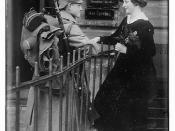
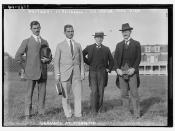
![[German vehicle tax registration issued to George Grantham Bain] (LOC)](https://s.writework.com/uploads/6/60390/german-vehicle-tax-registration-issued-george-grantham-bain-thumb.jpg)
